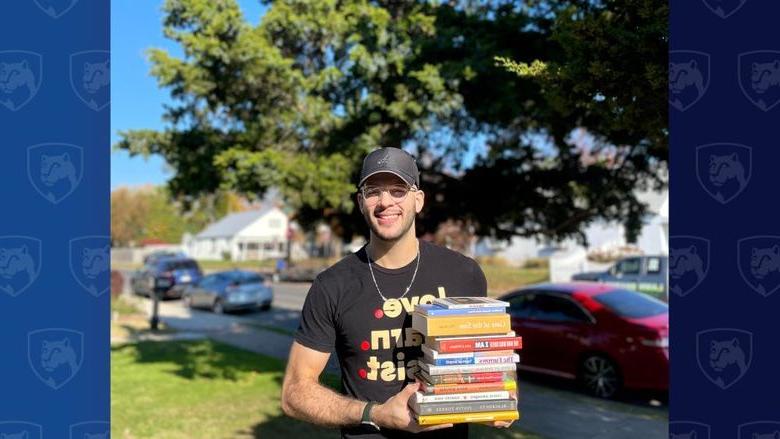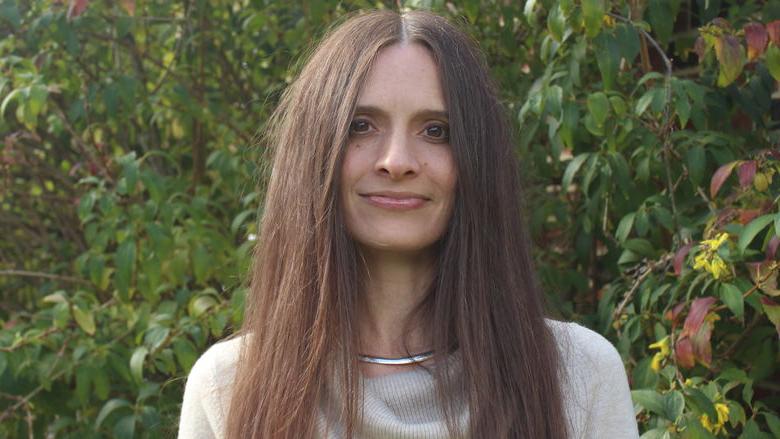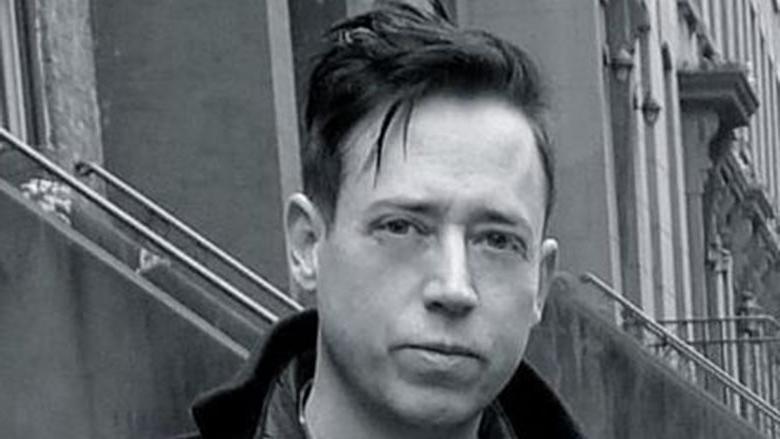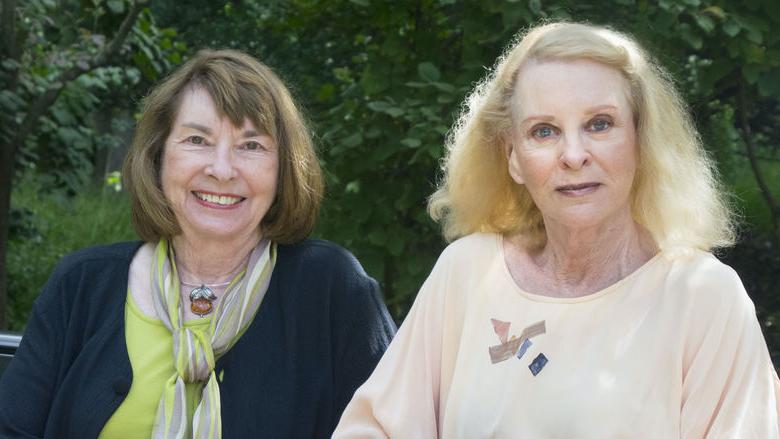Fall 2021 Course Descriptions
English Program and Writing Program
Penn State Abington
ENGLISH MAJOR REQUIREMENTS:
Traditions of Innovation
- ENGL 200 or 201: ENGL 201
- Medieval through Sixteenth Century: ENGL 440
- Sixteenth Century through Eighteenth Century: ENGL 440
- The Nineteenth Century: ENGL 400
- Twentieth Century to the Present: ENGL 435
- Literature, Writing, or Rhetoric: ENGL 050, ENGL 129, ENGL 135H, ENGL 183N, ENGL 184, ENGL 213, ENGL 215, ENGL 224N, ENGL 400, ENGL 413, ENGL 415, ENGL 420, ENGL 429, ENGL 435, ENGL 440, ENGL 480
- Diversity: ENGL 400
- Senior Seminar: ENGL 487W
Writing and Literature in Context
- ENGL 200 or 201: 201
- Pre-1800: ENGL 440
- Post-1800: ENGL 400, ENGL 435
- Literature, Writing, or Rhetoric: ENGL 050, ENGL 129, ENGL 135H, ENGL 183N, ENGL 184, ENGL 213, ENGL 215, ENGL 224N, ENGL 400, ENGL 413, ENGL 415, ENGL 420, ENGL 429, ENGL 435, ENGL 440, ENGL 480
- Diversity: ENGL 400
- Senior Seminar: ENGL 487W
WRITING MINOR COURSES: ENGL 050, ENGL 213, ENGL 215, ENGL 413, ENGL 415, ENGL 420 (REQUIRED), ENGL 480
ENGLISH MINOR COURSES: All ENGL courses count toward the English Minor.
ENGL 50: Introduction to Creative Writing (GA)
Section 001
Section 002
Professor Heise
Want to write, but aren’t quite sure how to get started or what to write about? This course is meant to ignite your interests, hone your skills, and introduce you to the foundational elements of poetry, fiction, and creative nonfiction so as to set free your imagination. You will learn to craft images, music, lines, and narrative in the poetry we practice. In fiction, you will learn how to create characters, develop themes, modulate tone and atmosphere, plot a conflict, and manipulate setting. And you will learn to translate and reconstruct personal experience, memory, and research into arguments, scenes, and narratives for creative nonfiction. Along the way, our conversations will turn to the writing and revision process, to why one writes in the first place, and to age-old inexhaustible questions, such as, what are the functions and purposes of poetry, short story, and the essay, what is the difference between truth and fact, and what are the ethics of writing about our own lives and the lives of others. In this course, you’re a writer. And that means you will be writing all the time in an exercise of imagination and perseverance. ENGL 050 welcomes all students interested in creative writing: no previous creative-writing experience is necessary.
ENGL 129: Shakespeare (GH)
Professor Nicosia
Explore the twisting comic plot of Twelfth Night, the politics of sex, power, and religion in Measure for Measure, the villainy of Macbeth, and the troubled reign of Richard II. This course is designed to deepen students’ knowledge of Shakespeare’s works through the study of the genres in which he wrote: comedy, history, tragedy, and romance. As we read Shakespeare’s plays, we will also consider how they engage with social and political issues of Shakespeare’s time as well as our own. This course is “stacked.” Students can enroll in this course at an introductory level (ENGL 129, GH) or at an advanced level ENGL 440.
ENGL 135 Honors: Alternative Voices in American Literature (GH)
Professor Naydan
ENGL 135 is an Honors survey course that invites students to study alternative voices in American literature, or literature that is written by authors of color and black, indigenous, women, LGBTQ+, immigrant, and other kinds of minoritized or historically marginalized authors who have an interest in critiquing power and privilege in the United States and the globalized world. We will focus on twenty-first-century texts in American historical contexts. These contexts involve, for instance, the War on Terror, #MeToo, Black Lives Matter, and anti-immigrant legislation. Authors will likely include Alison Bechdel, Junot Díaz, Louise Erdrich, Mohsin Hamid, Jhumpa Lahiri, Ling Ma, Toni Morrison, Claudia Rankine, Kristen Roupenian, and Gary Shteyngart. Through readings, discussions, and writing assignments, we’ll familiarize ourselves with aesthetic and rhetorical features of some of the most important novels, short stories, poems, essays, comics, and multi-genre texts of our lifetimes. We’ll also develop a literacy of literature as an inherently political medium that exists in dynamic interplay with and comments on the intersections of race, class, gender, sexuality, faith, nationality, language, and ability as well as the problems and possibilities of social justice.
ENGL 183N The Cold War In Literature, Politics, and History (GH)
Professor Jimmy J. Pack Jr.
At 8:15 a.m. local time in Hiroshima, Japan, the atomic bomb Little Boy was released from the Super Fortress Enola Gay. The bomb detonated 1,900 feet above the city with the resulting blast destroying everything within a one-mile radius of the epicenter. Estimates state that approximately 70% of the buildings in Hiroshima were destroyed. Conservative estimates put the total deaths at about 130,000. As the now iconic mushroom cloud rose over the Japanese landscape, so too did the specter of nuclear annihilation rise over the whole of the planet. After the subsequent bombing of Nagasaki just three days later, it became apparent to the entire world that the days of direct combat between world powers may well be over, and that a new age of unprecedented potential destruction was set to begin. It was the dawning of the nuclear era and the dawning of a creeping paranoia in the mind of every citizen of the world. In our English 183N class we will study primary texts, both fiction and nonfiction, to explore how the Cold War evolved, as well as view films that accurately captured the tension and global fear of mutually assured destruction that has dissipated since the fall of the Soviet Union.
ENGL 184: The Short Story
Professor Miller
Throughout time people have told stories in order to comprehend themselves and their history, or simply for the pure joy of recreating mutually felt human experiences. Such storytelling began within an oral tradition and then assumed a written literary form. Edgar Allan Poe (an American writer during the early 19th century) was probably the first to define the short story as its own literary genre, and stories written since Poe’s time might be judged by his succinct definition. A tale should be short enough to read in one sitting, he said, and be artfully structured so as to create a unified impression. This class will consider the major short story writers of the 19th and 20th centuries, with a primary focus on those 20th-century writers (many of them American) who have been the most influential in shaping this genre. We will consider the historical and cultural contexts for these stories while primarily analyzing them on their own artistic terms. What do these stories have to say about what it means to be human, and HOW do they go about saying it? The sophisticated textual critic will consider all facets of each story’s structural form in order to determine its predominant themes. Lectures and class discussions will assist students in developing their reading and interpretive skills, and students will be graded on their ability to communicate these interpretations both orally and in writing.
ENGL 201: What is Literature (GH)
Professor Rigilano
What is literature? Is it an objective category to which all writing of verifiably “literary” quality belongs? If so, what does the “literary” consist of? Or is it rather that literature names an ideological category that serves the interests of power? Or perhaps literature is the name we give to writing that produces a particular aesthetic experience in the reader? In asking these questions this course seeks to introduce students to key concepts in literary theory and literary history. Students will engage with a wide variety of texts and genres, including Elizabethan tragedy, postcolonial narrative, conceptual poetry, the Gothic novel, and much more.
ENGL 213: Introduction to Poetry Writing
Professor Heise
In this class we will immerse ourselves in the writing, reading, and study of poetry. The poetry you write during the semester will form the basis of the workshop—your small community of fellow writers whose work we will read, debate, praise, and critique. The workshops are the heart of this course, but they will be complemented with discussions of fundamental elements of craft, such as voice, image, lineation, and form that will help you improve your own writing, as well as help you talk about each other’s poems with greater precision and insight. Also this term, we will take up expansive questions of poetics that will shake up and deepen what you think poetry is and can be. We will do this by reading and analyzing manifestos, essays, and statements from key movements in twentieth- and twenty-first-century poetry and by engaging in a series of poetic experimentations. Finally, we will also read and assess recently published collections of poetry that we will study in order to learn how they move us in body and imagination. These works, along with everything else we do this semester, have one aim: to make you a better writer by developing and advancing your arsenal of poetic skills. This class is “stacked,” which means you can enroll in it at the introductory level (ENGL 213) or the advanced level (ENGL 413). Students enrolled in ENGL 413 will have additional and / or longer assignments.
ENGL 215 Introduction to Article Writing
Professor Cohen
Share your perspectives on campus and community issues! In this course, you will research, compose,edit, and publish articles for our digital news outlet The Abington Sun.
Over the course of the semester, you will work with a team of editors to build your writing skills as you work to publish well-researched, impactful articles.You can choose what to write about from a range of subjects which might include things like politics,current events, sports and arts and culture. If you like to write, are interested in learning and writing about current events, and want to see your work published, ENGL 215/415 is the place for you!
If you're new to The Abington Sun, you can register for ENGL 215. If you've worked with us before, you can advance your skills in ENGL 415.
ENGL 224N: Authors and Artists / Narrative Arts (Interdomain GA and GH)
Professor Cohen
Study abroad with Penn State—in Scotland
The art and creative writing programs invite you to participate in Narrative Arts in Scotland, a course featuring collaboration on a multimodal story with colleagues at the University of Dundee in Scotland’s UNESCO City of Design. You will explore Scotland’s rich history and social concerns by participating in workshops with local artists and authors, visiting museums, and experiencing sites in the Highlands ranging from 20th century Arctic exploration vessels, to Medieval castles, to Neolithic stone circles.
Authors call it “multimodal,” designers tag it “transmedia,” artists are inspired by Will Eisner’s term “sequential,” but these all explore a common idea: conveying story through sequential, often multimedia, formats. Though contemporary, their roots burrow surprisingly deep into other times and cultures, and they create immersive narrative experiences. For the audience, the allure lies in synthesizing elements into a whole. For authors, the challenge is to develop elements in such a manner that the arc of the narrative universe may be experienced in a manner unique to the individual spectator.
ENGL 224N: Authors and Artists, an Interdomain (Interdomain GA and GH)
Professor Knodt
Authors and Artists explores links between American writers and artists, including fiction inspired by visual artists, illustrators of fiction, pop culture including music and fiction, and comics and graphic novels. Literature and art connections in the course feature many American favorites like Washington Irving’s “Rip Van Winkle” and “The Legend of Sleepy Hollow,” reflecting the influence of the Hudson River School of landscape painting.Stephen Crane’s stories create in language what Impressionist painters accomplished in art. Kate Chopin depicts women artists in her exploration of what constitutes a “proper” life for women. Her contemporary, Pennsylvania artist Mary Cassatt, illustrates certain of those roles. Ernest Hemingway famously stated he wanted to write the way Cezanne painted, and F. Scott Fitzgerald captures The Roaring Twenties in style and song in The Great Gatsby. African American writer Richard Wright portrays the nightmare world of police brutality and injustice in 1940’s Chicago, and African American artist Horace Pippin depicts acts of discrimination and racism in his work. Graphic novels and memoirs make us feel and see in new ways, expanding the roles that comics played in entertaining us.
ENGL 400: The Literature of Imperialism (Stacked with ENGL 487W)
Professor Walters
From 17th to the early 20th century, it was said that “the sun never sets on the British empire.” This was a fact, given the extent of Britain’s formal and informal imperial presence across the globe. And during this period of empire, Britain underwent profound cultural, social, and economic upheaval. These changes included the beginning and dissolution of the transatlantic slave trade, the establishment of the East India Company and the Raj, and the process of decolonization in the 20th century, followed by what has been called re-colonization of England by those people who formed the overseas empire. In this course, we will examine a variety of fictional and non-fictional texts, including primary and secondary critical works, to scrutinize how empire and imperialism shaped modalities of British identity from the 17th to the 21st century. We will focus most extensively on writings from the 19th and early-20th century.
This is a writing-intensive course. Students will produce and workshop three short papers in different genres. Then, building upon these prior assignments, students will produce a longer research paper and present their research in a class conference.
NOTE: if you are a student who is hoping to graduate this semester and you require both a 19th-century course and the ENGL 487W course, speak to your advisor immediately. You will need to switch to the Writing and Literature in Context stream of the English major.
ENGL 413: Advanced Poetry Writing
Professor Heise
In this course we will immerse ourselves in the writing, reading, and study of poetry. The poetry you write during the semester will form the basis of the workshop—your small community of fellow writers whose work we will read, debate, praise, and critique. The workshops are the heart of this class, but they will be complemented with discussions of fundamental elements of craft, such as voice, image, lineation, and form that will help you improve your own writing, as well as help you talk about each other’s poems with greater precision and insight. Also this term, we will take up expansive questions of poetics that will shake up and deepen what you think poetry is and can be. We will do this by reading and analyzing manifestos, essays, and statements from key movements in twentieth- and twenty-first-century poetry and by engaging in a series of poetic experimentations. Finally, we will also read and assess recently published collections of poetry that we will study in order to learn how they move us in body and imagination. These works, along with everything else we do this semester, have one aim: to make you a better writer by developing and advancing your arsenal of poetic skills. This class is “stacked,” which means you can enroll in it at the introductory level (ENGL 213) or the advanced level (ENGL 413). Students enrolled in ENGL 413 will have additional and / or longer assignments.
ENGL 415 Advanced Article Writing
Professor Cohen
Share your perspectives on campus and community issues! In this course, you will research, compose, edit, and publish articles for our digital news outlet The Abington Sun. Students in ENGL 415 will build on the skills they learned in ENGL 215 to conduct primary research--conducting interviews and analyzing data, in order to generate ideas for stories of interest to our campus community. Students will pitch their story ideas weekly to an audience of their peers, and decide collectively with editors which stories will move forward. Over the course of the semester, each student should plan to produce and publish several news articles and feature pieces, improving writing skills in a hands-on process as they work to publish well-researched, impactful articles. Subjects for articles range from politics to current events, sports and arts and culture. Feel free to browse past topics at The Abington Sun. If you like to write, are interested in learning and writing about current events, and want to see your work published, ENGL 215/415 is the place for you! If you haven’t worked with us before, you should enroll in ENGL 215. If you’re a veteran of our writing staff who wants to further hone your skills, you should register for ENGL 415. If you’re interested in gaining editorial experience, fill out an application for a position as Editor here: http://forms.gle/RzxFGc3VcBHDooyF9
ENGL 420 Writing for the Web
Professor De Piero
Writing for the web isn’t limited to typing words on a webpage; it means communicating to expansive audiences through images, sound, and video. From audience awareness to audio/visual production, we’ll study the theoretical and technical aspects of how digital texts are produced, consumed, and distributed across online contexts. Of course, to gain authentic practice with writing for the web, we’ll need to actually write for the web. That means I’ll be expecting you to publish your work online. We’ll write a consumer review, participate in a community blog, craft a “How to” YouTube video, and reflect on our countless writerly decisions.
ENGL 429 New Media in Literature / Narrative Arts in SCOTLAND
Professor Cohen
Study abroad with Penn State—in Scotland
The art and creative writing programs invite you to participate in Narrative Arts in Scotland, a course featuring collaboration on a multimodal story with colleagues at the University of Dundee in Scotland’s UNESCO City of Design. You will explore Scotland’s rich history and social concerns by participating in workshops with local artists and authors, visiting museums, and experiencing sites in the Highlands ranging from 20th century Arctic exploration vessels, to Medieval castles, to Neolithic stone circles.
Authors call it “multimodal,” designers tag it “transmedia,” artists are inspired by Will Eisner’s term “sequential,” but these all explore a common idea: conveying story through sequential, often multimedia, formats. Though contemporary, their roots burrow surprisingly deep into other times and cultures, and they create immersive narrative experiences. For the audience, the allure lies in synthesizing elements into a whole. For authors, the challenge is to develop elements in such a manner that the arc of the narrative universe may be experienced in a manner unique to the individual spectator.
English 435: The American Short Story
Professor Miller
Throughout time people have told stories in order to comprehend themselves and their history, or simply for the pure joy of recreating mutually felt human experiences. Such storytelling began within an oral tradition and then assumed a written literary form. Edgar Allan Poe (an American writer during the early 19th century) was probably the first to define the short story as its own literary genre, and stories written since Poe’s time might be judged by his succinct definition. A tale should be short enough to read in one sitting, he said, and be artfully structured so as to create a unified impression. This class will consider the major short story writers of the 19th and 20th centuries, with a primary focus on those 20th-century writers (many of them American) who have been the most influential in shaping this genre. We will consider the historical and cultural contexts for these stories while primarily analyzing them on their own artistic terms. What do these stories have to say about what it means to be human, and HOW do they go about saying it? The sophisticated textual critic will consider all facets of each story’s structural form in order to determine its predominant themes. Lectures and class discussions will assist students in developing their reading and interpretive skills, and students will be graded on their ability to communicate these interpretations both orally and in writing.
ENGL 440: Studies in Shakespeare
Professor Nicosia
Explore the twisting comic plot of Twelfth Night, the politics of sex, power, and religion in Measure for Measure, the villainy of Macbeth, and the troubled reign of Richard II. This course is designed to deepen students’ knowledge of Shakespeare’s works through the study of the genres in which he wrote: comedy, history, tragedy, and romance. As we read Shakespeare’s plays, we will also consider how they engage with social and political issues of Shakespeare’s time as well as our own. This course is “stacked.” Students can enroll in this course at an introductory level (ENGL 129, GH) or at an advanced level ENGL 440. Students enrolled in ENGL 440 will engage in individual research and read secondary works by literature scholars.
ENGL 487W: The Literature of Imperialism (Stacked with ENGL 400)
Professor Walters
From 17th to the early 20th century, it was said that “the sun never sets on the British empire.” This was a fact, given the extent of Britain’s formal and informal imperial presence across the globe. And during this period of empire, Britain underwent profound cultural, social, and economic upheaval. These changes included the beginning and dissolution of the transatlantic slave trade, the establishment of the East India Company and the Raj, and the process of decolonization in the 20th century, followed by what has been called re-colonization of England by those people who formed the overseas empire. In this course, we will examine a variety of fictional and non-fictional texts, including primary and secondary critical works, to scrutinize how empire and imperialism shaped modalities of British identity from the 17th to the 21st century. We will focus most extensively on writings from the 19th and early-20th century.
This course is a writing-intensive Senior Seminar. Students will produce and workshop three short papers in different genres. Then, building upon these prior assignments, students will produce a longer research paper and present their research in a class conference.
NOTE: if you are a student who is hoping to graduate this semester and you require both a 19th-century course and the ENGL 487W course, speak to your advisor immediately. You will need to switch to the Writing and Literature in Context stream of the English major.





